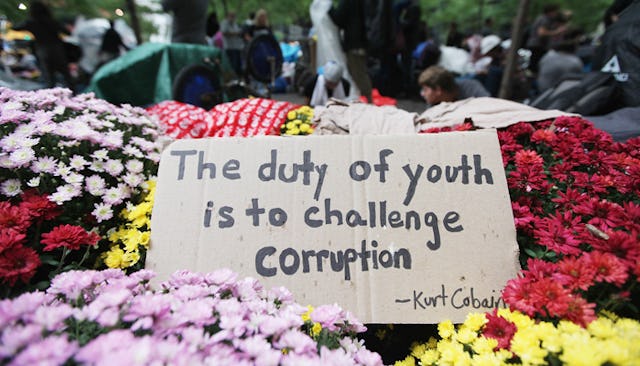The Day Kurt Cobain, And Grunge Music, Died

The year was 1991. Many of us were in high school or college, caught up in our own teen dramas. MTV was still the place to watch the latest videos. On September 29, we watched a blond-haired guy thrash back and forth, jumping, singing and screaming. A group of high school kids dutifully sat in the bleachers as cheerleaders led them on from the court. First they observed with bored stares, then heads began to move and feet tapped. The music drove them as they jumped out of their seats unable to contain themselves. They moshed, they dove and they crowd-surfed, eventually spilling onto the court—they were so filled with angst, passion, feeling. It was absolute and utter teen pandemonium. Even the square cheerleaders joined them as they formed a hormone-fueled mob. The song, “Smells Like Teen Spirit,” was dubbed an anthem for the apathetic kids of Gen-X.
We strove to inject meaning into the words we didn’t exactly understand, though we knew we wanted to and we knew they meant something, everything, to us. But of course, the words didn’t really matter. It was all about the feeling, the music, the vibe. We had never heard anything like it, the bastard love child of hardcore punk and heavy metal. But we–on couches, in basements and in living rooms–understood that this was epic. Had our parents felt this way when they watched Elvis gyrate or The Beatles croon on Ed Sullivan?
For us, this was a defining moment. We had entered the era of grunge. Yes, it had started years before in Seattle during the mid-’80s, but now with a four-minute video and three raggedy-looking guys, it had shot deep into the angst-infused hearts of suburban youth. These bands got us, our feelings, our pain, our need to be understood. We filled our closets with flannels, ripped jeans and boots. We embraced filth. (Well, maybe not filth, but we put gel in our hair just minutes after showering to get that unkempt look, and we didn’t use conditioner.) We rolled up our hair-band posters and traded in glam for grunge. We went from made-up to made-under. We had found a new love, and we nurtured it. Pearl Jam, Sound Garden, Alice in Chains and Stone Temple Pilots became our gods. We rushed to our local record stores with allowances and paychecks from chores and first jobs, and we bought it all up.
Three years later, on April 8, 1994, the unthinkable happened. Kurt Cobain’s body was discovered above his garage at his Lake Washington house in Seattle. For us—the followers of this new tribe of poets and rockers, this new legion of gods—it was a moment of pure tragedy. We remember where we were and who we were with when we heard the news of our rock idol’s untimely and self-inflicted death. I was in college getting ready for a night out with my roommate, decked out in a flannel, ripped jeans and black combat boots. I’ll never forget. For me–for us–it was a moment of examination of both ourselves and the music we loved. Kurt Cobain had committed suicide. He left behind a wife and young child. He left behind a group of heartbroken kids who thought he had the answers they needed. Kurt Cobain was 27.
There were theories and reasons behind his suicide, like there always are with rock stars. None mattered much to us. The importance came with the realization that an era in our lives was, if not over, irrevocably changed and tarnished. Most of us continued to listen to grunge and wear the uniform, but some small part of us was gone. We watched the the remaining two members of the band—Dave Grohl and Krist Novoselic—go their separate ways, and just like that, Nirvana was essentially a memory.
With the death of Cobain came a new awareness surrounding depression, suicide and drug abuse, and grunge music changed. Cobain himself became a symbol of what can go wrong when you get too much, too soon. We no longer just heard the music when we listened to Nirvana; we heard the warning, the signs we had missed, the pain Cobain lived with and had never truly shared with any of us, not really. His death brought all the vices of the rock-and-roll industry to the forefront as it had so many times before when musicians died too young because they wanted and had too much, too fast.
As the years passed and our tastes changed, we self-labeled grunge kids forgot the days of moshing and diving. We were thrust away from our own angst and moved further along in our lives as adults. We traded flannels and boots for dress shirts and heels. But, every once in a while—like today, September 29—we remember. Today marks 24 years since we first watched the video and heard the song, “Smells Like Teen Spirit.” We remember the angst, the feeling, the music. Today, we are not Mom or Dad. Today, we thrash and dive from couches and minivans as we roll down windows letting the song scream as it did, for us, years before. We embarrass children at drop-off and pickup. Today, we fight against rules and oppression. Today, we are, once again, young.
This article was originally published on